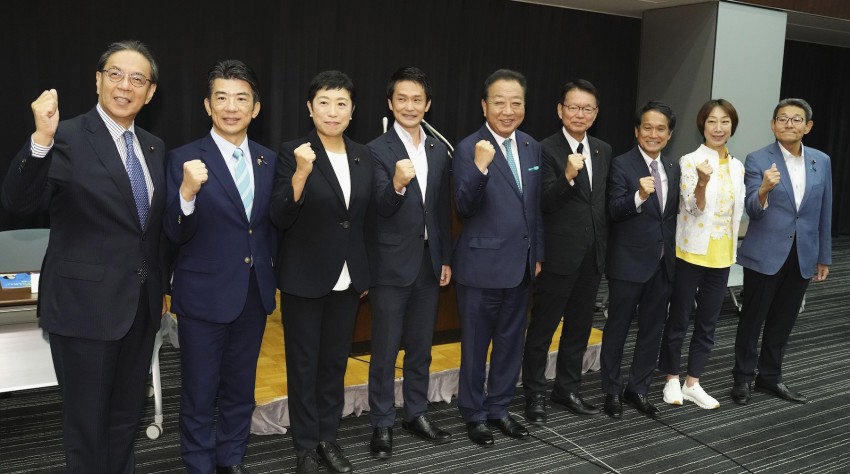The major opposition in Japan’s is betting on experience ahead of a potential election.
TOKYO – Former Prime Minister Yoshihiko Noda’s success in the leadership election of Japan’s largest opposition party on Monday reinforced its plan to bank on “experience” to seize power in a likely general election by the end of this year.
The Constitutional Democratic Party of Japan’s leadership competition was affected by the Liberal Democratic Party’s struggle to nominate a successor to Prime Minister Fumio Kishida, who opted to stand down to accept responsibility for a high-profile slush money scandal.
Noda defeated party founder Yukio Edano, 60, in a runoff to become the head of the left-leaning CDPJ at a time when public confidence in the conservative LDP has been severely damaged by the controversy surrounding fundraising events. The governing party has dominated for the majority of the period since its 1955 establishment.
The LDP only lost power for nearly a year after the 1993 House of Representatives election, when a coalition of opposition parties established a government, and for roughly three years after its humiliating 2009 defeat to the now-defunct Democratic Party of Japan.
There is growing conjecture in Japan that the incoming prime minister, who will be chosen by parliament on October 1, may dissolve the lower house and call for an early election.
The opposition party’s race presented a challenge for power as more feasible than it has ever been since the DPJ landslide; several contenders, including Noda, the previous prime minister to be appointed outside the LDP in 2011–2012, dubbed it “the night before a change of government.”
But according to analysts, the opposition party’s route to power is fraught with uncertainty. Challenges include which LDP candidate will win the Friday vote and how the CDPJ can build relations with other opposition forces, especially those focused on centrist policies.
“Many unaffiliated voters could be convinced to support” Noda as the next CDPJ leader, who offers extensive political experience, according to Ritsumeikan University politics professor Masato Kamikubo. “Voters might try to punish the LDP over the slush fund scandal,” Kamikubo added.
In mid-August, a survey by Kyodo News revealed that 17.8% of voters did not identify with any party, while 36.7 percent of respondents supported the LDP as it garnered public attention for its presidential contest and 12.3 percent supported the CDPJ.
To reverse the course of events, the blueprint for a possible victory is less like the resounding success of 2009 and more like the coalition takeover that brought opposition forces together in 1993. Noda’s aptitude in manoeuvring through the dispersed resistance camp would be put to the test.
The 1993 Cabinet led by then Prime Minister Morihiro Hosokawa “enacted political reforms, with parallels to today,” Kamikubo said, as the LDP lost its majority in the aftermath of the Recruit bribery scandal in the late 1980s involving unlisted shares.
The CDPJ, meanwhile, has been traumatized by its cooperation with other parties, having been criticized for seeking to boost ties with the Japanese Communist Party, which advocates radical policies like abolishing the Self-Defense Forces and the imperial system.
In 2021, Yukio Edano, founder and then leader of the CDPJ, bolstered relations with the JCP by consolidating their candidates for a better chance at winning single-seat districts in the House of Representatives election, but his party lost more than 10 seats, forcing him to resign.
The setback of former House of Councillors lawmaker Renho, backed by the CDPJ and the JCP, in the Tokyo gubernatorial election in July also sent shockwaves, as a relatively unknown, social media-savvy former mayor surpassed her, leaving her in third place.
Such experiences have sparked expectations among CDPJ lawmakers that the new leader may aim to strengthen ties with slightly right-leaning opposition forces, including the second-largest opposition, the Japan Innovation Party.
Professor of political science at Hosei University Hiroshi Shiratori stated that while speculation of a change of government the night before is premature, the opposition group is probably going to step up attempts to divide the LDP’s majority in the summer 2025 upper house election.
Four candidates competed in Monday’s CDPJ leadership election: Noda, Edano, Kenta Izumi, who headed the party for around three years starting in November 2021, and Harumi Yoshida, a first-term member of the lower house and the sole female contender.
The next prime minister of Japan will undoubtedly be chosen by the LDP on Friday, when it elects its new party president. Former Environment Minister Shinjiro Koizumi, former Defence Minister Shigeru Ishiba, and Minister of Economic Security Sanae Takaichi are among the record nine candidates.
If Koizumi, the 43-year-old son of former Prime Minister Junichiro Koizumi, is elected, it might provide a window of opportunity for the CDPJ to beat the LDP, as veteran lawmaker Noda, 67, could corner the young leader by demonstrating stability in debates, analysts said.
But Takaichi, a conservative lawmaker eager to become Japan’s first female premier, and Ishiba, making his fifth bid to be LDP chief, would put pressure on the CDPJ, as both are skilled debaters — she with her strong ideology and he with his extensive career.

